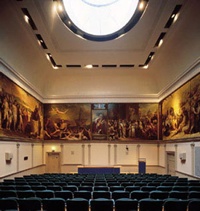RSA Conference on The Social Impact of the Web: Society, Government and the Internet
Posted on Tue, Apr 24, 2007 at 12:04 AM by Andrew Chadwick

I'm one of the speakers at the RSA's special conference on 'The Social Impact of the Web: Society, Government and the Internet' on May 25th. Top of the bill is Professor Cass Sunstein, School of Law, University of Chicago. The other speakers are: Tom Steinberg, founder of the wonderful MySociety, William Davies, Institute for Public Policy Research, Matthew Taylor, Director of the RSA and former Chief Adviser on Political Strategy to the Prime Minister, and Georgina Henry, Assistant Editor of The Guardian.
For more information and to book a place (free of charge), see the RSA site.
This promises to be an excellent event. I've been to the RSA a couple of times before and it's a superb venue.
A quote from the original email invitation, courtesy of David Wilcox's blog:
"The RSA is looking to explore the political culture and norms that the internet has been instrumental in fostering, both in relation to centralised democratic politics, and more diffuse social and civic networks, including blogging.
Our view in essence is that the high hopes of the 90s for e-democracy and new forms of on-line consultation and community mobilisation have not been met. Rather than fostering new forms of constructive engagement, dialogue and 'pro-social' community action, the type of politics most favoured by the internet seems to be conversations between fellow believers, anti-establishment cynicism and single issue mobilisation. Too many attempts by public authorities to use the web simply involved putting existing information and processes on-line.
The communication model has been vertical and mainly downward. But we think the emergence of web 2.0 offers an opportunity to revive the idealism of a decade ago. While internet 1.0 continued to reinforce an 'us' versus 'them' divide between citizens and power, we can envisage web 2.0 encouraging a rich and constructive 'us and us' dialogue in which citizens deliberate, innovate and act together."